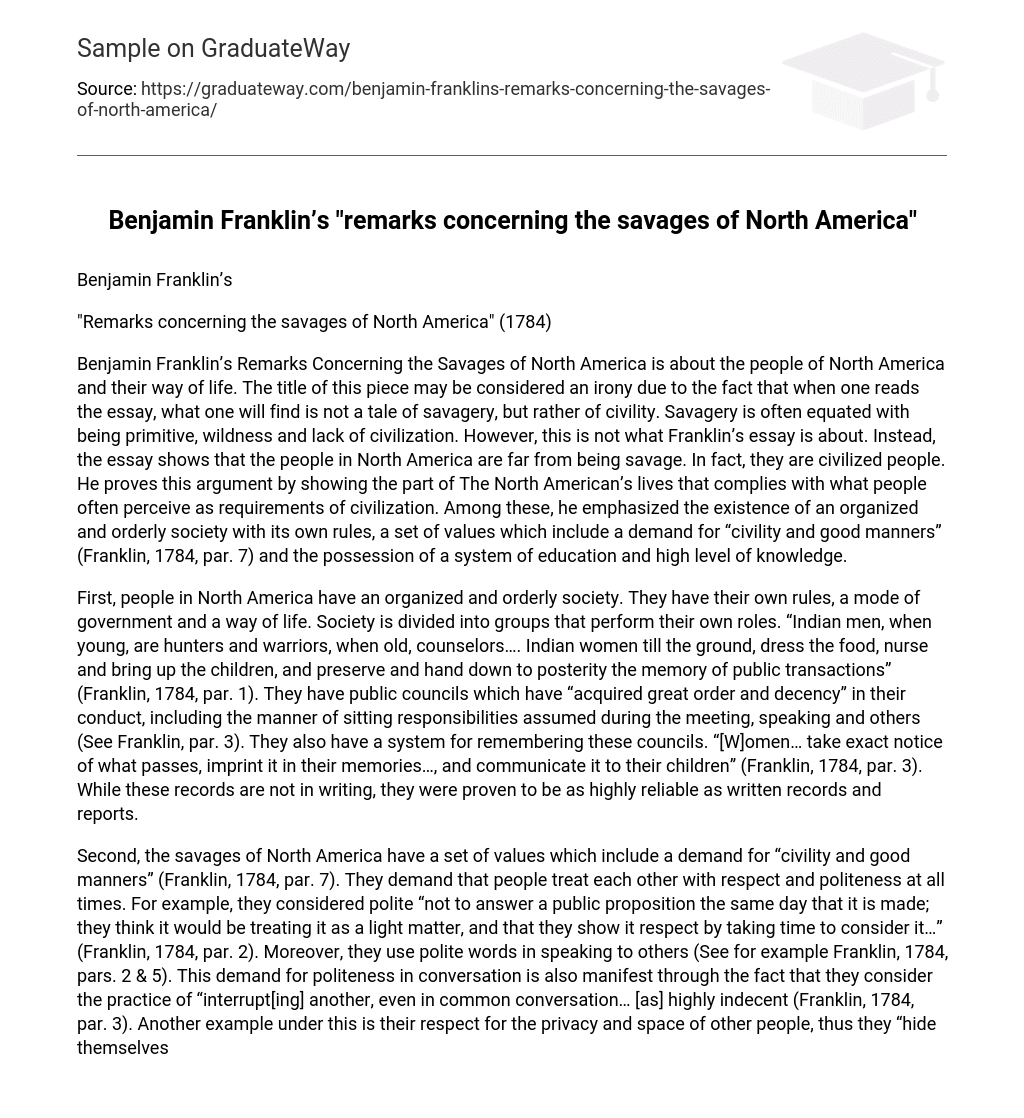Benjamin Franklin’s Remarks Concerning the Savages of North America is about the people of North America and their way of life. The title of this piece may be considered an irony due to the fact that when one reads the essay, what one will find is not a tale of savagery, but rather of civility. Savagery is often equated with being primitive, wildness and lack of civilization. However, this is not what Franklin’s essay is about.
Instead, the essay shows that the people in North America are far from being savage. In fact, they are civilized people. He proves this argument by showing the part of The North American’s lives that complies with what people often perceive as requirements of civilization. Among these, he emphasized the existence of an organized and orderly society with its own rules, a set of values which include a demand for “civility and good manners” (Franklin, 1784, par. 7) and the possession of a system of education and high level of knowledge.
First, people in North America have an organized and orderly society. They have their own rules, a mode of government and a way of life. Society is divided into groups that perform their own roles. “Indian men, when young, are hunters and warriors, when old, counselors…. Indian women till the ground, dress the food, nurse and bring up the children, and preserve and hand down to posterity the memory of public transactions” (Franklin, 1784, par. 1).
They have public councils which have “acquired great order and decency” in their conduct, including the manner of sitting responsibilities assumed during the meeting, speaking and others (See Franklin, par. 3). They also have a system for remembering these councils. “[W]omen… take exact notice of what passes, imprint it in their memories…, and communicate it to their children” (Franklin, 1784, par. 3). While these records are not in writing, they were proven to be as highly reliable as written records and reports.
Second, the savages of North America have a set of values which include a demand for “civility and good manners” (Franklin, 1784, par. 7). They demand that people treat each other with respect and politeness at all times. For example, they considered polite “not to answer a public proposition the same day that it is made; they think it would be treating it as a light matter, and that they show it respect by taking time to consider it…” (Franklin, 1784, par. 2).
Moreover, they use polite words in speaking to others (See for example Franklin, 1784, pars. 2 & 5). This demand for politeness in conversation is also manifest through the fact that they consider the practice of “interrupt[ing] another, even in common conversation… [as] highly indecent (Franklin, 1784, par. 3). Another example under this is their respect for the privacy and space of other people, thus they “hide themselves behind bushes… [when people from other places] are to pass, and never intrude [them]selves into [their] company” (Franklin, 1784, par. 7).
Lastly, the savages of North America possess of a system of education and high level of knowledge. Old men “generally study oratory, the best speaker having the most influence” in the counsel of sages (Franklin, 1784, par. 1). They have their own system and manner of educating their youth. It might be different from the system of education of more civilized places such as Virginia, but their system of education that is geared towards their culture and needs. They know that “different nations have different conceptions of things…” (Franklin, par. 2).
Their needs are different from the needs of other countries. They are a community of hunters, warriors, and counselors that lives in the woods. Their educational needs are not the same as industrial countries whose focus is the sciences (See Franklin, 1784, par. 2). This shows a high level of understanding among them of their community and their needs.
In conclusion, while many people may consider Indians as savages, they are not really uncivilized. Their way of life is different, but that does not make them savages. Like other civilized nations, they have an organized and orderly society and own rules. Their requirements as to good manners and values are as high as that of other nations. Lastly, they have their own system of education that is geared to their needs and a high level of knowledge. These, among others, make the savages of North America civilized people.
References
- Franklin, B. (1784). Remarks Concerning the Savages of North America. Retrieved June 28, 2007, from http://www2.latech.edu/~bmagee/202/franklin/Savages2.htm.





